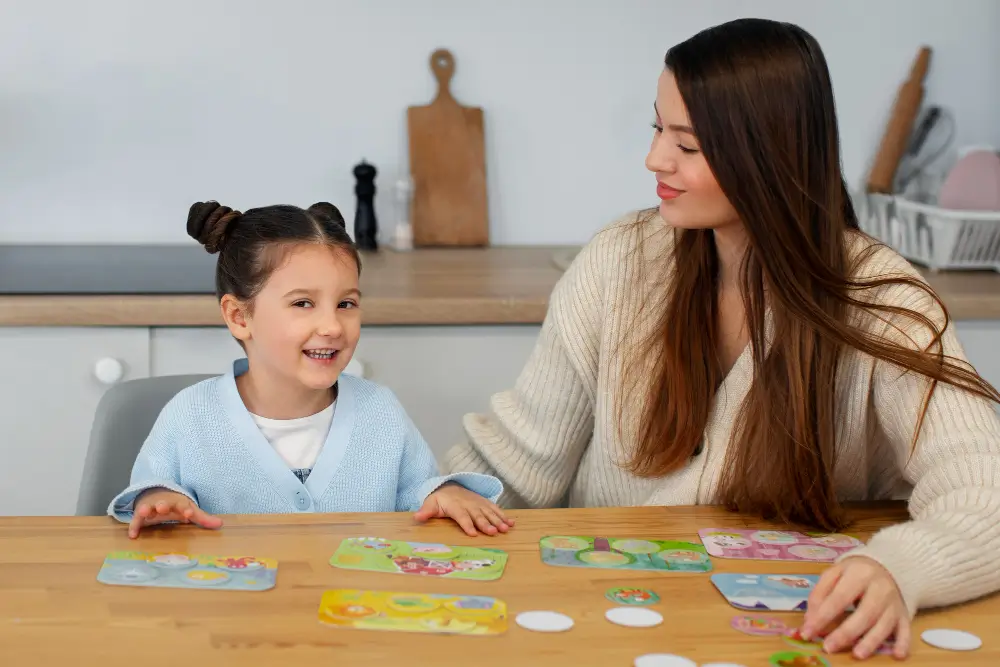Every goodbye seems like the end of the world, both for you and your child. But what if there were fun ways to ease that overwhelming fear? Separation anxiety can take many forms, and the solution might be simpler—and more fun—than you think. Could the right game change everything? Discover how play therapy activities can transform tearful goodbyes into confident new beginnings.
Safe space, big progress—Book a play therapy appointment in Brooklyn now! 🏠🧠

Most Effective Play Therapy Techniques for Overcoming Separation Anxiety
Overcoming separation anxiety through play therapy involves creating an emotionally safe space that supports open expression and active adult involvement. The first step is to create a warm, inviting environment where children feel secure and understood. Accessible toys and an empathetic relationship with the therapist help build the trust needed for children to explore their emotions.
Once this safe space is established, techniques are introduced that promote emotional expression and gradual desensitization. Role play, imaginative scenarios, and guided discovery activities help children recognize and symbolically release their fears. Gradual and controlled separations, paired with goodbye rituals and preparation, support children as they face fears step by step.
Parental involvement plays a key role in reinforcing progress beyond the therapy setting. When caregivers engage with therapeutic strategies at home—using positive reinforcement and promoting autonomy—the recovery process becomes stronger and more consistent for the child.
How Play Therapy Helps Children Overcome Separation Anxiety with Proven Methods
Play therapy offers an effective and child-friendly way to address separation anxiety. It uses symbolic play as a natural language that aligns with a child’s level of development and interaction. In a safe environment supported by a trusting therapeutic relationship, children are encouraged to explore their emotions and learn ways to cope with being apart from loved ones.
Through playful activities, children can reenact difficult experiences like parental separation and explore alternative ways to respond. This symbolic repetition helps them gain emotional control and feel less anxious.
Working with a therapist or even other children supports the development of social skills like communication, empathy, and cooperation. Accomplishing small challenges in play builds confidence and a sense of achievement, strengthening emotional resilience and self-esteem.
Play therapy provides a constructive and approachable path for children to deal with separation anxiety. It gives them tools to face fears and develop social-emotional skills they can carry throughout life.
Top Play Therapy Activities to Relieve Separation Anxiety in Children
Separation anxiety is a real challenge for both children and caregivers. Play therapy provides symbolic and emotional ways to manage this experience.
Below are the most effective and practical play therapy activities, organized by type and therapeutic goal:
| Role Play | Simulate separation, reinforce routines | Goodbye scene using dolls or figures |
| Puppets and Dolls | Symbolic emotional expression | Conversations between puppet characters |
| Personalized Stories | Anticipate and reassure | Story about a character who returns home |
| Art Therapy | Express and release emotions visually | Drawing about school experiences |
| Sand Play | Symbolic processing of scenarios | Building a house or school in the sandbox |
| Movement Games | Release tension and support regulation | Kids’ yoga or expressive dance |
| Board Games | Practice roles and improve focus | Family role-play board games or memory |
These activities not only help children express their emotions but also support their ability to face separations with greater confidence. Through play, children begin to see goodbyes not as endings, but as part of a routine that always leads to reunion.
Why Play Therapy Activities Are Essential for Managing Separation Anxiety
Play therapy helps children address separation anxiety by allowing them to express feelings through symbolic and creative play. It enables them to project fears, frustrations, and concerns in ways that don’t require verbal expression. Therapists can then identify emotional needs and support the child through a compassionate, responsive approach.
Play also teaches coping strategies. Children act out situations of separation, helping them prepare emotionally and reduce stress. Regular practice strengthens their ability to manage future goodbyes and builds self-confidence through emotional mastery.
Play therapy also improves communication between children and caregivers. It allows children to express feelings more openly and helps parents better support their child’s emotional needs. With these benefits, play therapy becomes a key component in guiding children through the process of overcoming separation anxiety.
Sources:
- O’Connor, K. J., & Ammen, S. (2012). Play therapy treatment planning and interventions: The ecosystemic model and workbook. Academic Press.
- Koukourikos, K., Tsaloglidou, A., Tzeha, L., Iliadis, C., Frantzana, A., Katsimbeli, A., & Kourkouta, L. (2021). An overview of play therapy. Materia socio-medica, 33(4), 293.
